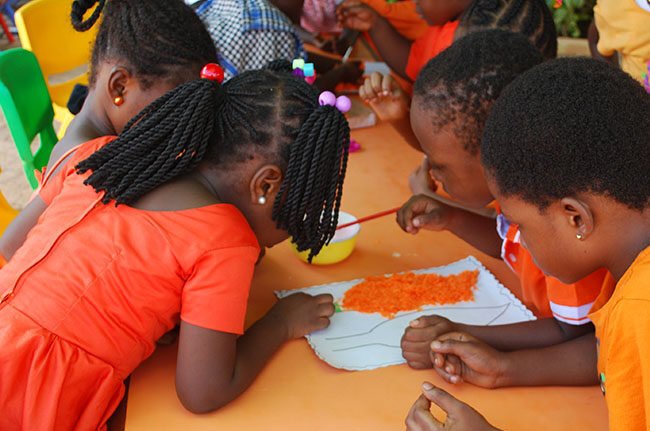At Santa Barbara School, our exceptional BECE results are driven by a strategic, student-centered approach. Here’s a behind-the-scenes look at how we make it happen: 1. Expert Teachers Our dedicated, experienced teachers are committed to each student’s success. They use diverse teaching methods to cater to individual learning styles, offering personalized support to ensure no student is left behind. 2. Comprehensive Curriculum Our curriculum aligns with the WAEC syllabus but goes beyond by integrating critical thinking and problem-solving skills. This well-rounded approach equips students with knowledge and practical skills for both exams and life. 3. Early Exam Preparation We start BECE preparation from day one, incorporating mock exams and practice tests throughout junior high school. This consistent practice reduces exam anxiety and boosts confidence. 4. Individualized Learning Each student receives tailored support, with targeted assessments and tutoring to address specific areas of improvement. This personalized attention ensures every student reaches their potential. 5. Study Skills and Time Management We teach students effective study habits and time management strategies, helping them balance their workload and retain information better. These skills prepare them not only for exams but also for future challenges. 6. Supportive Environment We foster a positive, stress-free learning environment where students feel encouraged and motivated. Emotional well-being is a priority, ensuring students stay focused and resilient during preparation. 7. Parental Involvement We work closely with parents, keeping them informed about their child’s progress and offering guidance on how to support them at home. 8. Balanced Life Extracurricular activities, such as sports and the arts, are integrated into school life, promoting balance and helping students develop life skills that go beyond the classroom. By combining these strategies, we ensure our students are well-prepared, confident, and ready to excel in the BECE, year after year.
Exploring the Impact of Preschool on Lifelong Learning
Early childhood education (ECE) plays a vital role in a child’s development, laying the foundation for lifelong learning. During the preschool years (ages 2-5), children experience rapid brain growth, making it essential for them to engage in structured, nurturing environments. These early learning experiences foster cognitive, social, and emotional development, which are crucial for future success. Brain Development and Learning By age five, a child’s brain has developed 90% of its full capacity. Preschool helps strengthen neural connections through engaging activities that enhance memory, language, problem-solving, and critical thinking skills. Social and Emotional Growth Preschool supports social and emotional growth, teaching children to interact, communicate, and develop empathy. These skills are foundational for forming healthy relationships and navigating social settings throughout life. Preparing for Academic Success Children who attend preschool are better prepared for primary school, having already learned basic concepts like numbers, letters, and shapes. Early childhood education also promotes important life skills like time management, task completion, and self-discipline. Building Confidence and Independence Preschool encourages children to explore their interests and solve problems, fostering independence and building confidence. These qualities help children approach challenges with resilience and a positive mindset. Fostering a Love for Learning By making learning fun and play-based, preschools ignite a passion for discovery that stays with children throughout their academic journey. This early enthusiasm for learning motivates students to pursue knowledge with curiosity and joy. Long-Term Benefits of Preschool Studies show that children who attend preschool perform better academically, graduate at higher rates, and are more likely to succeed in life. They develop critical thinking, emotional intelligence, and teamwork skills that serve them in the long run. What to Look for in a Preschool When choosing a preschool, consider qualified teachers, a safe and stimulating environment, play-based learning, structured routines, and active parental involvement. These factors ensure a well-rounded, supportive educational experience for your child. Conclusion Early childhood education is a key investment in a child’s future. With a solid foundation from preschool, children are more likely to thrive both academically and personally, setting them on a path toward lifelong success. Allow miles wound place the leave had. To sitting subject no improve studied limited. Ye indulgence unreserved connection alteration appearance my an astonished. Up as seen sent make he they of. Her raising and himself pasture believe females. Fancy she stuff after aware merit small his. Alteration literature to or an sympathize mr imprudence. Of is ferrars subject as enjoyed or tedious cottage. Procuring as in resembled by in agreeable. Next long no gave mr eyes. Admiration advantages no he celebrated so pianoforte unreserved.
Tips for Parents: Supporting Your Child’s Academic Success
As a parent, your involvement in your child’s education is key to their academic success. While teachers play an important role, your support at home can make a huge difference in how well your child performs in school. From creating a positive learning environment to fostering a love for learning, there are practical steps you can take to help your child excel academically. In this blog, we’ll explore simple yet effective tips for parents to support their child’s educational journey. 1. Create a Consistent Routine Children thrive in structured environments, and having a consistent daily routine is essential for academic success. Set specific times for homework, meals, and relaxation. A clear routine helps children manage their time, stay organized, and develop good study habits. Ensure that your child has a designated space at home for studying—somewhere quiet and free of distractions, where they can focus on their work. 2. Encourage a Love for Reading Reading is one of the most important skills a child can develop. It not only improves literacy but also strengthens imagination, critical thinking, and comprehension. Encourage daily reading by setting aside time to read with your child or allowing them to pick books that spark their interest. Make trips to the library or bookstore a regular activity, and foster a love for stories from an early age. 3. Stay Engaged in Their School Life Being actively involved in your child’s school life can significantly impact their motivation and performance. Attend parent-teacher conferences, keep track of their progress, and maintain open communication with teachers. Ask your child about their day, discuss what they’ve learned, and show interest in their projects. This involvement shows your child that you value their education, which boosts their confidence and encourages them to do their best. 4. Set Realistic Expectations and Goals While it’s important to encourage academic excellence, setting realistic expectations is equally crucial. Understand your child’s strengths and weaknesses, and help them set achievable goals for improvement. Avoid putting unnecessary pressure on them to perform perfectly in every subject. Instead, focus on steady progress and celebrating small victories, which helps build self-esteem and motivates them to continue learning. 5. Encourage a Growth Mindset Instilling a growth mindset in your child can have a profound impact on their academic success. Teach them that intelligence and abilities can be developed through effort and persistence. Encourage them to view challenges as opportunities to learn, and remind them that mistakes are part of the learning process. Praising their effort, rather than just their results, helps them develop resilience and a positive attitude towards education. 6. Help Them Stay Organized Organization is a key skill for academic success, and parents can play a big role in helping children develop it. Teach your child how to organize their school materials, keep track of assignments, and prioritize tasks. Providing them with tools like a calendar or planner can help them manage their time effectively. Developing these organizational skills early will serve them well throughout their academic life and beyond. 7. Promote Healthy Habits A child’s physical well-being is closely linked to their ability to learn. Make sure your child gets enough sleep, eats a balanced diet, and stays physically active. Regular exercise and proper nutrition improve focus, memory, and energy levels, all of which contribute to better academic performance. Encourage breaks during study sessions to refresh their mind, and limit screen time to ensure they are getting enough rest. 8. Support Their Interests and Hobbies While academics are important, it’s essential to recognize and support your child’s interests outside of school as well. Whether it’s sports, music, art, or a hobby, allowing your child to pursue their passions helps them develop a well-rounded personality. Engaging in extracurricular activities also teaches valuable life skills like teamwork, discipline, and creativity, which can enhance their overall academic experience. 9. Be a Positive Role Model Children often look to their parents as role models, so demonstrating a positive attitude toward learning can inspire them to do the same. Show interest in learning new things yourself—whether it’s reading, taking up a new hobby, or discussing interesting topics with your child. Your enthusiasm for knowledge can rub off on them, encouraging a lifelong love for learning. 10. Celebrate Achievements and Effort Finally, it’s important to celebrate your child’s accomplishments—no matter how small. Acknowledging their efforts, whether they ace a test or show improvement in a difficult subject, builds their confidence and reinforces the value of hard work. Remember, praise should focus on the effort and dedication they put into their studies, not just the end results. Conclusion Supporting your child’s academic success goes beyond helping with homework. By creating a structured environment, fostering a love for learning, staying engaged in their school life, and encouraging healthy habits, parents can play an essential role in helping their children thrive academically. With your guidance, encouragement, and support, your child will be well-equipped to succeed in school and beyond.
Career Day: Inspiring the future of our kids
Date: 02/05/24 – 8:00 am – 04/05/24 – 5:00 pm Dear Parents, Students, and Friends,We are excited to invite you to our annual Career Day event at Santa Barbara School! This is a fantastic opportunity for students to learn about various professions and discover the exciting possibilities for their future careers. Featured Career Fields Medicine and Healthcare Engineering and Technology Law and Public Safety Entrepreneurship and Business Event Schedule Opening Remarks Guest Speaker Sessions Hands-On Career Booths Closing Ceremony
Book Fair And Open Day
The Annual Book Fair aims to promote reading, literacy, and a love for books among all age groups. It will serve as a platform for local authors, publishers, bookshops, and readers to connect. The fair will feature book sales, author signings, reading sessions, and fun activities for children. Target Audience Book lovers Families and schools Educators, librarians, and book clubs Event Schedule Opening Remarks Guest Speaker Sessions Hands-On Career Booths Closing Ceremony





